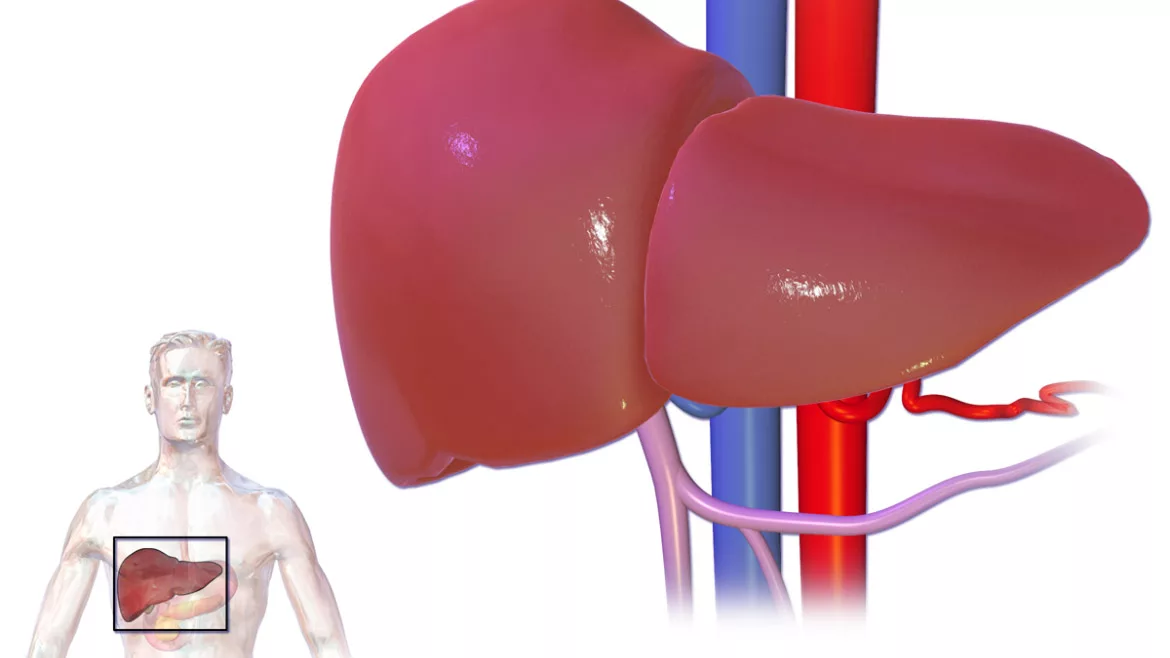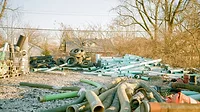How vinyl chloride from the Ohio train derailment can damage the liver
Its health risks were discovered in the 1970s at a B.F. Goodrich factory in the Rubbertown neighborhood of Louisville, Kentucky.

Photo by Bruce Blaus on Wikicommons
Vinyl chloride – the chemical in several of the train cars that derailed and burned in East Palestine, Ohio, in February 2023 – can wreak havoc on the human liver.
It has been shown to cause liver cancer, as well as a nonmalignant liver disease known as TASH, or toxicant-associated steatohepatitis. With TASH, the livers of otherwise healthy people can develop the same fat accumulation, inflammation and scarring (fibrosis and cirrhosis) as people who have cirrhosis from alcohol or obesity.
That kind of damage typically requires relatively high levels of vinyl chloride exposure – the kind an industrial worker might experience on the job.
However, exposures to lower environmental concentrations are still a concern. That’s in part because little is known about the impact low-level exposure might have on liver health, especially for people with underlying liver disease and other risks.
As an assistant professor of medicine and environmental and occupational health, I study the impact of vinyl chloride exposure on the liver, particularly on how it may affect people with underlying liver disease. Recent findings have changed our understanding of the risk.
Lessons from ‘Rubbertown’
Vinyl chloride is used to produce PVC, a hard plastic used for pipes, as well as in some packaging, coatings and wires.
Its health risks were discovered in the 1970s at a B.F. Goodrich factory in the Rubbertown neighborhood of Louisville, Kentucky. Four workers involved in the polymerization process for producing polyvinyl chloride there each developed angiosarcoma of the liver, an extremely rare type of tumor.
Their cases became among the most important sentinel events in the history of occupational medicine and led to the worldwide recognition of vinyl chloride as a carcinogen.
The liver is the body’s filter for removing toxicants from the blood. Specialized cells known as hepatocytes help reduce the toxicity of drugs, alcohol, caffeine and environmental chemicals and then send away the waste to be excreted.
The hallmark of vinyl chloride exposure to the liver is a paradoxical combination of normal liver function tests and the presence of fat in the liver and the death of hepatic cells, which make up the bulk of the liver’s mass. However, the detailed mechanisms that lead to vinyl chloride-induced liver disease are still largely unknown.
Recent research has demonstrated that exposure to vinyl chloride, even at levels below the federal limits for safety, can enhance liver disease caused by a “Western diet” – one rich in fat and sugar. This previously unidentified interaction between vinyl chloride and underlying fatty liver diseases raises concerns that the risk from lower vinyl chloride exposures may be underestimated.
Outdoor exposure and the risk from wells
In outdoor air, vinyl chloride becomes diluted fairly quickly. Sunlight also breaks it down, typically in nine to 11 days. Therefore, outdoor air exposure is likely not a problem except with intense periods of exposure, such as immediately following a release of vinyl chloride. If there is a chemical smell, or you feel itchy or disorientated, leave the area and seek medical attention.
Vinyl chloride also disperses in water. The federal Clean Water Act requires monitoring and removing volatile organic compounds such as vinyl chloride from municipal water supplies, so those shouldn’t be a concern.
However, private wells could become contaminated if vinyl chloride enters the groundwater. Private wells are not regulated by the Clean Water Act and are not usually monitored.
Vinyl chloride readily volatilizes into the air from water, and it can accumulate in enclosed spaces located above contaminated groundwater. This is especially a concern if the water is heated, such as for showers or during cooking. Vinyl chloride gas in enclosed spaces can therefore accumulate. This effect is similar to recent concerns about fumes from natural gas stoves in poorly ventilated homes.
Although there are established safety levels for acute and intermediate exposure, such levels don’t exist for chronic exposures, so testing over time is important.
What can be done? Anyone with a private well that may have been exposed to vinyl chloride should have the well monitored and tested more than once. People can air out their homes and are encouraged to seek medical help if they experience dizziness or itching eyes.
![]()
Juliane I. Beier, Assistant Professor of Medicine and Environmental Health, Member of Pittburgh Liver Research Center, University of Pittsburgh
This article is republished from The Conversation under a Creative Commons license. Read the original article.




